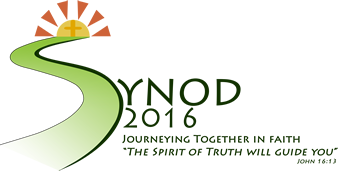Setting the Compass
If the synod were to be no more than an event of a few days, it would probably be a waste of time. The risk would be that it would only produce a report gathering dust on the shelf. The Synod will have to mark a real step forward, indicating a realistic pathway of genuine renewal for all of us who feel faith is important.
For the Synod to be successful it will need to touch each one of us personally. It will have to be underwritten by a “soul” dimension. In other words, the spiritual attitude with which we approach this period of discernment is very important. It needs to be a spiritual experience of journeying together in communion with one another. For that reason I would like to highlight three sources to draw upon during the Synod.
 The Gospel. Every true renewal in the Church has come from a rediscovery of the Gospel as a code of life to be put into practice. We can think of the Irish monks decorating the Gospel that was so central to the flourishing of Irish monasticism that developed into a major missionary outreach in Europe. The Gospel is not just a book to console us, teach us or guide our prayers. It contains the unique and universal, eternal and powerful words of Jesus that can change our lives.
The Gospel. Every true renewal in the Church has come from a rediscovery of the Gospel as a code of life to be put into practice. We can think of the Irish monks decorating the Gospel that was so central to the flourishing of Irish monasticism that developed into a major missionary outreach in Europe. The Gospel is not just a book to console us, teach us or guide our prayers. It contains the unique and universal, eternal and powerful words of Jesus that can change our lives.
To understand the Gospel, we need to put it into practice. St. James reminds us: “But be doers of the word, and not merely hearers….For if any are hearers of the word and not doers, they are like those who look at themselves in a mirror; for they look at themselves and, on going away, immediately forget what they were like. But those who look into the perfect law, the law of liberty, and persevere, being not hearers who forget but doers who act—they will be blessed in their doing.” (James 1:22-25).
Before Christmas 2014 a pocket-size version of the Gospel of Luke will be distributed to everyone in the Diocese. I invite everyone in the diocese to see how they can discover the Gospel in a new way and “do” it. Perhaps read some part of the Gospel every day either on your own or with your family; take the Sunday readings you hear at Mass and read them reflectively at home; select a short passage of the Gospel as a motto for every day or for a week or month to guide you. Most importantly, find others with whom you can share your experiences of the Gospel either in your family or in a community or in a group such as a lectio divina group.
Our love for one another. If the Synod is to be effective, we will need to re commit ourselves to living the New Commandment Jesus gave us: love one another as I have loved you (cf. Jn 13:34). It is the fundamental “law” of the Church. Without this love, we will not sense God’s presence; we will be deaf to his words and blind to his ways. It is in love for one another that our spiritual antennae are alerted to what God is saying to the Church.
For a wonderful description of what that means for us, let’s listen to what a freeman of Limerick City, Saint John Paul, wrote some years ago when he invited all of us to make of the Church a school and home of communion.[1] He explained that we need to have ‘an ability to think of our brothers and sisters in faith within the profound unity of the Mystical Body, and therefore as "those who are a part of me".’ He referred to the dynamic of relating to others in such a way as to be “able to share their joys and sufferings, to sense their desires and attend to their needs, to offer them deep and genuine friendship”.
The Pope pointed out that our love for one another ‘implies also the ability to see what is positive in others, to welcome it and prize it as a gift from God: not only as a gift for the brother or sister who has received it directly, but also as a "gift for me".’ Saint John Paul affirms we need ‘to know how to "make room" for our brothers and sisters, bearing "each other's burdens" (Gal 6:2)’ and resisting the selfish temptations which constantly beset us and provoke competition, careerism, distrust and jealousy.’
At the heart of Saint John Paul’s concern was the need to provide our institutions with a “soul”. We need to live together a spirituality of communion. None of us can claim we already know it or live it perfectly. The Synod will be an opportunity to “train” in living the spirituality of communion as we listen to one another, speak with one another and discern together.
The Crucified and Risen Jesus Christ. Nothing worthwhile is achieved in the Christian life without the mystery of the Cross. In laying down his life for us, Jesus brought about our union with God and with one another. Christians have always seen in the Cross the sign of God’s immense love for each person. Jesus Christ reaches us in our sinfulness and need. As the Limerick poet, Tadhg Gaelach Ó Suilleabháin put it, Jesus was “astray…from heaven, tormented in our midst in a way that cannot be estimated”. [“Ar fán… ó neamh…cráite trínne, i slí nach léir a mheas”.] The Crucified Christ is the key to living through our sufferings and difficulties. Uniting our trials with those of Jesus on the Cross, we find the strength to live like him in laying down our lives for others. This is what we celebrate and remember at every Mass.

To set out on a journey always involve some element of difficulty – fatigue, unexpected delays, loss of direction, need to check the map, re-fuelling. Setting out on our journey towards the Synod we can expect it won’t always be easy. There may be moments of difficulty in understanding one another, in persevering once we’ve started, in clashing points of view, in needing to take time to deepen our faith, in trying to come to clear conclusions.
It will be important to recognise in tensions that might arise the presence of the Crucified Christ who took onto himself all the divisions and tensions of this world and transformed them on the Cross. He even reached the point of crying out “why?” at the end of his life. But his question became the answer to all our questions. After all he had said: “unless a grain of wheat falls into the earth and dies, it remains just a single grain; but if it dies, it bears much fruit” (Jn 12:24).
The first sisters of Mercy in Limerick remembered Catherine McAuley's good advice to them on how to live the mystery of the Cross in their lives: "Don’t let crosses vex and tease. Meet them all with peace and ease... Attend to one thing at a time, You’ve sixteen hours from morning prime.”
In uniting ourselves to the Crucified Christ and in imitation of him as we persevere along the journey, we will experience the great gift of his Risen presence among us to guide us. We will experience what the disciples on the Road to Emmaus described when they said: “Were not our hearts burning within us while he was talking to us on the road” (Lk 24: 32). It is my hope that we will indeed experience the Risen Jesus among us because he brings the Spirit who fills us with joy and ardour, peace and hope. Let’s listen again to Pope Francis,
Christ’s resurrection is not an event of the past; it contains a vital power which has permeated this world. Where all seems to be dead, signs of the resurrection suddenly spring up… Faith also means believing in God, believing that he truly loves us, that he is alive, that he is mysteriously capable of intervening, that he does not abandon us and that he brings good out of evil by his power and his infinite creativity… Christ’s resurrection everywhere calls forth seeds of that new world; even if they are cut back, they grow again, for the resurrection is already secretly woven into the fabric of this history, for Jesus did not rise in vain. May we never remain on the sidelines of this march of living hope!
[1] See John Paul II, Apostolic Letter, Novo Millennio Ineunte, 43.
